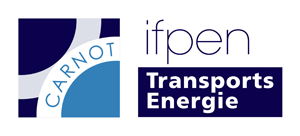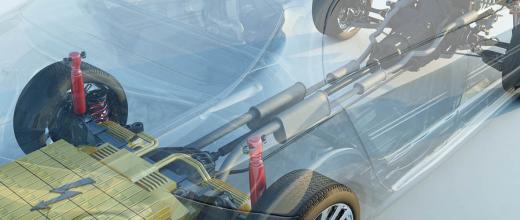 BATTERIES: FROM DESIGN TO RECYCLING
BATTERIES: FROM DESIGN TO RECYCLING
Our networks
Competitiveness clusters, consortiums
COMUTES² consortium
Created in 2018 at the initiative of IFPEN, alongside CEA-LITEN, EIGSI, Gustave Eiffel University, IMS and UTC, the COMUTES² (COnsortium pour la MUtualisation de Tests Electriques sur
Systèmes de Stockage, , or consortium for the pooling of electric tests on storage systems)consortium aims to set up and carry out joint battery aging test campaigns, open to external members. The first test campaign, dedicated to the cold aging of Li-Ion batteries, was conducted in 2020. The second, concerning the issue of aging of LFP prismatic cells, was launched in June 2023. The third campaign will start in early 2025: consultation is underway to identify a subject of interest for a majority of industrial players.
RS2E network
RS2E (Réseau français sur le stockage électrochimique de l’énergie, that is the French electrochemical energy storage network) brings together public and private players to accelerate fundamental research in new battery technologies and supercapacitors, as well as its transfer to industry. Thanks to its participation in RS2E, IFPEN consolidates its research in the field of batteries, particularly by aligning its developments with industrial needs and identifying research partners for theses or collaborative projects.
Collaborative projects
OPTIMA
The OPTIMA (Outil de ProducTion Innovant de Matières Actives or Innovative active material production tool) project, selected within the framework of BPI France’s ”Strategic Projects in the battery value chain” call for expressions of interest, was launched by IFPEN and Axens in 2024. Its 4-year target is to establish the country’s first precursor cathode active material (pCAM) pilot production facility at the Salindres industrial site in the Gard region of southern France. This pilot facility will aim to accelerate the development of the pCAM sector in France, by preparing the new generations of these key battery materials for electric vehicles and serving as a model for future production plants.
MACADAMIA
The MACADAMIA (MAtériaux pour CAthoDe pour une AMbItion frAnçaise, or Cathode materials for a French ambition)project, selected within the framework of BPI France’s ”Strategic Projects in the battery value chain” call for expressions of interest, was launched in 2024 for a period of eight years by IFPEN and Axens. The aim is to develop future generations of cathode active materials, key components of batteries for electric vehicles. These materials, derived from recycled metals in accordance with very strict environmental standards, will enable France to reduce its reliance on critical metals and achieve industrial sovereignty in this sector of the future. Research conducted by IFPEN’s teams is dedicated to the development of formulations and manufacturing processes for these high-tech finished products.
BATSS
The aim of the European BATSS (Safe efficient BATtery SyStem based on advanced cell technology) project is to develop advanced expertise in battery system technologies. Coordinated since 2024 by CIDETEC Energy Storage (Spain), it brings together 11 European academic and industrial partners. The objective of BATSS is to develop a new and safe battery pack concept that is electrically, thermally and mechanically optimized for use in several vehicle types, including construction site machinery. Research being conducted by IFPEN’s teams concerns the electrochemical and thermal characterization of the cell, 1D parametric modeling and simulation, 3D simulation (thermal gas runaway propagation), aging tests, life cycle analysis (LCA) and determination of the life cycle cost (LCC) of the battery pack.
This project received funding from the European Union’s Horizon Europe research and innovation program through grant agreement 101103821.
BATCAT
The European BatCAT (BATtery Cell Assembly Twin) project is aimed at developing a digital twin of battery manufacturing steps and their sequencing, based on multi-physical simulations and driven by data. Led since 2024 by the Norwegian University of Life Sciences, it brings together 17 partners including universities, companies and research centers across Europe. IFPEN is contributing its physical battery behavior models developed over a number of years through its research activities. This digital twin is aimed, in particular, at improving our understanding of battery degradation, and the link between these degradations and manufacturing parameters, in order to develop more efficient and durable batteries. The digital twin will be validated on small-scale production lines for Li-ion and Na-ion batteries, enabling a broad parametric study.
This project received funding from the European Union’s Horizon Europe research and innovation program through grant agreement 101137725.
HyList
The European HyList (Hybrid Lithium Metal-based Scalable Solid State Battery Manufacturing) project, conducted by AIT alongside 11 academic and industrial partners, including IFPEN, will be launched in 2024 for a period of three years. The aim is to develop an ASSB (All Solid-State Battery) technology using a hybrid organic electrolyte that conducts only lithium ions (HSICP: hybrid single-ion ceramic polymer), a cobalt-free, high-voltage spinel positive electrode: LNMO (lithium nickel manganese oxides), and a lithium metal negative electrode. IFPEN is leading the multiscale modeling research. The project is broken down into three sub-sections: transport modeling in the electrolyte at microstructure level, multiphysical modeling for the study of performances, aging and safety at cell level, and system simulation for vehicle and aviation applications. IFPEN is also contributing to the economic and life-cycle studies as well as the tests (electrochemical, swelling, safety).
This project received funding from the European Union’s Horizon Europe research and innovation program through grant agreement 101147688.
ISSTOGRAM
Supported by BPI France within the framework of the “Investment project support to produce the road vehicles of tomorrow and their components in France” program as part of France Relance 2030, the ISSTOGRAM (Industrialisation d’un Système de STOckaGe RecyclAble pour la Mobilité, or industrialization of a recyclable storage system for mobility) project, led by Savoy, brings together several Savoy International Group entities, Wise intégration, Pymco Technologies and IFPEN as a research partner. The aim of this three-year project, launched at the start of 2024, is to industrialize battery packs with a high environmental value for light vehicles (from scooters to four-wheel vehicles) in Europe. The battery packs can be disassembled, facilitating maintenance and re-use. IFPEN is responsible for setting up a rapid diagnosis tool to determine the cell health status once disassembled. This algorithmic tool based on artificial intelligence has been patented by IFPEN. Ultimately, it will be integrated into the Savoy Group’s battery pack production/disassembly line.
BATMAN
The ANR BATMAN (BATteries: data Mining, Artificial intelligence and digital twins for the Next generation) project is aimed at introducing artificial intelligence into the development of new-generation batteries. Conducted since 2023 by Sorbonne University in partnership with the French Alternative Energies and Atomic Energy Commission (CEA), the CNRS, Toulouse III University, CINES and IFPEN, the project has three major objectives: to develop a high-throughput screening methodology adapted to Li metal interfaces with solid-state battery electrolytes, Na-ion battery electrolytes and 2D materials for high-power batteries; develop new tools to simulate the changes that occur at the electrode/electrolyte interface; create a digital twin capable of predicting and optimizing the link between manufacturing, electrode properties and performances for all-solid-state and Na-ion technologies.
SONIC
The SONIC (Solid-state Organic anioNIC battery)project, led by the IMN (Nantes Materials Institute), is one of the seven winning projects selected within the context of the “Batteries” PEPR (French priority research program and equipment) call for projects. SONIC brings together four laboratories (IMN, LRCS, CEA, IFPEN) working on the construction of a solution to reduce the overall environmental footprint of batteries. Launched in 2023, SONIC aims to develop anion-ion-type, metal-free solid-state molecular batteries compatible with anionic conduction polymer electrolytes over the next five years.
HELENA
The Horizon Europe HELENA (Halide solid state batteries for ELectric vEhicles aNd Aircrafts) project, led by CIC Energigune (a Basque energy storage research center), brings together 15 academic and industrial partners including IFPEN. It was launched in 2022 for a period of four years. The aim is to develop an ASSB (All Solid-State Battery) with a high energy density and a high power density. The technology will combine a halide-type inorganic solid electrolyte, developed by Saint-Gobain for vehicle and aviation applications, a high-capacity Ni-rich NMC positive electrode and a lithium metal negative electrode. IFPEN is responsible for the cross-functional multi-scale and multi-physical modeling (from material to system) to support all of the project’s developments. IFPEN’s contributions include various developments, models and experimental testing.
This project received funding from the European Union’s Horizon Europe research and innovation program through grant agreement 101069681.
Micro-Q-Li
The ANR Micro-Q-Li (Microscopie LIBS Quantitative du Lithium, or quantitative lithium LIBS microscopy) project, conducted since 2021 by IFPEN in partnership with the lLM (the French Institute of Light and Matter), is aimed at developing quantitative lithium microscopy based on the LIBS (Laser-Induced Breakdown Spectroscopy) imaging technique. The objective is to reduce by a factor of ten the current spatial resolution of this technique to the micron scale while retaining sufficient lithium sensitivity. The tool could then be used to analyze the internal components of Li-ion batteries, such as electrodes, and thus make it possible to locate and quantify cyclable lithium losses due to various microscopic internal aging mechanisms. The elementary images obtained are made quantitative by obtaining calibration curves for electrodes set to controlled states of charge and whose lithium content is determined independently by atomic emission spectroscopy. A prototype has been produced in the context of this project. It has been used to measure the analytical performances of the process and demonstrate its contribution to the characterization of lithium ion batteries for several case studies.
AuRAnode
The AuRAnode (Auvergne-Rhône-Alpes anode) project, led by ENWIRES in partnership with Tokai Cobex and IFPEN since 2021 and financed within the framework of the French “Strategic Projects for Regional Competitiveness” call for projects, is aimed at producing a negative electrode material for lithium-ion batteries in the Auvergne-Rhône-Alpes region. Named SiBoost™, this material designed by ENWIRES and made up of a silicon-graphite composite, should lead to a doubling of the energy density that can be stored in the negative electrode. Useable in existing battery cell production plants, it could be used in future European gigafactories and help give Europe a head start in the field of renewable energy storage and electric mobility. IFPEN is contributing to the optimization of the material in its pre-industrial version via physicochemical analyses, experimental testing on various scales and mechanical behavior modeling, in particular.









